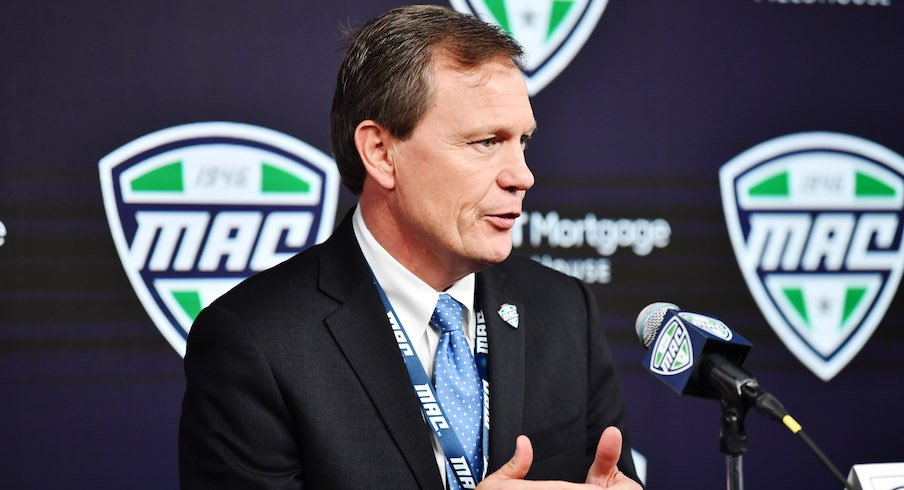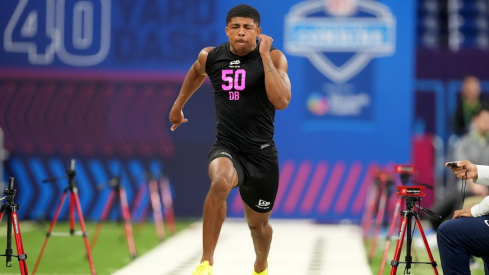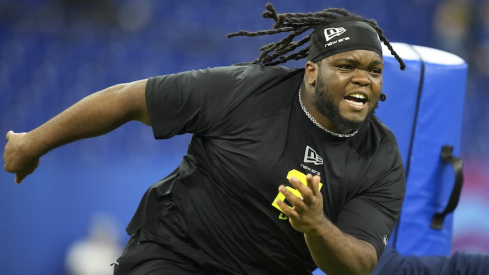Among all the conferences affected by the Big Ten’s decision last week to cancel all non-conference games for its fall sports teams, none stands to be impacted more greatly than the Mid-American Conference.
Because both conferences are centered in the Midwest, MAC teams are popular choices for non-conference game opponents for Big Ten sports teams. For the 2020 football season alone, MAC schools were set to play 11 combined non-conference games against Big Ten schools, more than any other conference. And most of those games, including Ohio State’s scheduled home games against Bowling Green and Buffalo, were set to pay those schools more than a million dollars for their football teams’ trips to Big Ten stadiums.
So MAC commissioner Jon Steinbrecher was disappointed – and like commissioners from many other conferences, a bit surprised the decision came when it did – when he learned on Thursday that the Big Ten would play conference games only this fall. But he isn’t dwelling on it now.
“I hadn’t anticipated the decision being made quite so soon, but I knew all of our conferences have been talking about an array of scheduling options,” Steinbrecher told Eleven Warriors on Tuesday. “And so, where they’ve gone with it, would I have preferred they didn’t? Yes, but they made a decision to prioritize their conference schedule. So be it. Now it’s let’s work through the details and get it figured out.”
Now that those games have been canceled, one of the big remaining questions from the MAC’s perspective is the financial element, as the guaranteed payouts its schools receive from non-conference football games against Power 5 opponents are crucial to their athletic budgets.
For example, Bowling Green has budgeted to make $2.667 million in game guarantees – including $1.2 million for the game it was scheduled to play at Ohio State on Sept. 5 – making up more than 12 percent of its projected $21.57 million for the 2020-21 fiscal year. Buffalo was set to make $1.8 million to play at Ohio State on Sept. 19, which would have amounted to 18.5 percent of UB’s football revenues for the 2019 fiscal year, according to The Buffalo News.
Ohio State’s contracts with Bowling Green and Buffalo, specifically, stipulate that OSU is still responsible for making those payouts, minus payouts received by those schools for any games scheduled to replace their games against the Buckeyes. It’s possible, though, that the COVID-19 pandemic could be applied to force majeure clauses in non-conference game contracts, like those in Ohio State’s contracts which state that no payout is required if “it becomes impossible to play the game for reasons that include “unforeseen catastrophes or disasters beyond the control of either party.”
That said, Steinbrecher expects the Big Ten schools to fulfill their financial obligations and says there has already been communication between the Big Ten schools and the MAC schools that were scheduled to play each other as well as between him and Big Ten commissioner Kevin Warren.
“The day they announced, Big Ten ADs were reaching out,” Steinbrecher said. “I’ve had conversations with Kevin Warren. What’s been shared with me is he expects obligations to be fulfilled. So ADs on both sides will work through those things, and hopefully come to a satisfactory arrangement for all involved.”
Ohio State athletic director Gene Smith said last week that he was uncertain whether OSU would have to make its scheduled payouts to Bowling Green and Buffalo, saying he would begin having those conversations with their athletic directors this week, though he did say efforts would be made to reschedule the Buckeyes’ games against the Falcons and the Bulls.
Aside from the financial element, Steinbrecher says he is disappointed that MAC sports teams will miss out on the opportunities to compete against the Big Ten that so many of them were set to have this fall. But he expects the two conferences to continue to have a strong relationship for many years to come.
“We really enjoy matching up with our Big Ten peers,” Steinbrecher said. “We’re in the same footprint, we’ve worked closely together. Many of our coaches and administrators have been back and forth between the various schools in our league. We collaborate on a lot of things and work together on a lot of things. So we enjoy those competitive opportunities.
“We have really, really warm and productive relationships with the Big Ten Conference and their member institutions, and would anticipate that that will continue.”
As for the MAC itself, Steinbrecher said no decisions have been made yet about whether its fall sports will be played as scheduled, though he acknowledged those decision points are “coming at us in the not-too-distant future.” If they are able to play football this fall, it’s possible the Big Ten’s decision could potentially mean some MAC teams playing more games than others – Bowling Green, Ball State, Central Michigan and Northern Illinois were each set to play two non-conference games against Big Ten opponents, while five other schools haven’t had any non-conference games canceled yet – but Steinbrecher said that’s a possibility they had already discussed and recognized they might have to accept.
He says his conference has tried to focus on controlling what it can control while preparing for the various scenarios that could ultimately play out.
“We’ve been proceeding all along, let’s prepare as if the season’s going to start in time – whether it’s in football or volleyball or field hockey or cross country or whatever it may be – but also be thinking about and laying out principles and thinking through issues we’re going to have to deal with in case of a decision that causes us to change course in some way,” Steinbrecher said. “And you know what, there are so many variables, you can’t necessarily write down in ink exactly what you’re gonna do, but you certainly think through the processes you go through, know the directions you would likely head and the principles that would guide you.”


